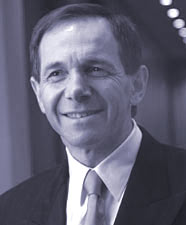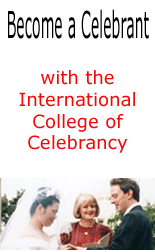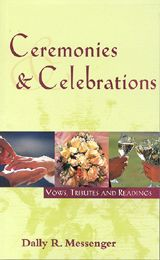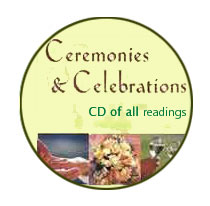At the time this was -
For the Australian Federation of Civil Celebrants
The office bearers were
Secretary : Rick Barclay, 41 Murray Rd, Croydon, Victoria.
National President: Dally Messenger
May 13, 1992
 Second Legal Opinion of the renowned constitutional lawyer Professor Michael Pryles (Minter Ellison Morris Fletcher)
Second Legal Opinion of the renowned constitutional lawyer Professor Michael Pryles (Minter Ellison Morris Fletcher)
Comment/Summary
This is the actual submission put to the Attorney-General on or about the date mentioned above.
In softer terms than his first opinion, it still argues that constitutionally rules and regulations, including fees and advertising rules, cannot be loaded onto civil celebrants unless they are also loaded onto the clergy.
He also cogently argues, on many legal and political precedents, that the Government, while committed to non-discrimination in almost every context, is discriminating against civil celebrants and favouring religious celebrants by denying the former freedoms, and granting them to the latter.
Dally Messenger
* * * * * * * * * * * * * * * * * * * *
The Attorney-General
Commonwealth of Australia
Parliament House
CANBERRA ACT 2600
Dear Attorney General,
Authorised Celebrants
We write to you on behalf of our clients the Australian Institute of Civil Celebrants who comprise Authorised Celebrants registered under the Marriage Act 1961 (Commonwealth). We wish to raise important questions of policy and law concerning authorised celebrants. Specifically our clients are concerned about institutionalised discrimination and, more generally, the regulation of authorised celebrants.
Discrimination
1. Civil authorised celebrants ( "civil celebrants" ) are subject to certain restrictions and limitations which do not apply to Ministers of Religion who are authorised to solemnise marriages under the Marriage Act. In particular,
(a) Civil celebrants are not permitted to charge a fee for officiating at a marriage beyond that prescribed in the regulations. No such restriction is imposed on celebrants who are Ministers of Religion.
(b) Ministers of Religion may solemnise marriages in any manner they see fit but civil celebrants are required under sub—section 45(2) and section 46 of the Marriage Act to use certain words and phrases.
Civil celebrants are actively discouraged from officiating at a marriage in a "church" or "chapel" by virtue of administrative guidelines set by the Attorney General's department. Of course no such prohibition applies to celebrants who are Ministers of Religion. While generally, a Minister of Religion will be the appropriate celebrant in respect of a marriage in a "church" or "chapel". We can see no reason why a civil celebrant should be prohibited from acting in such a venue if the owners give permission.
2. The Commonwealth of Australia has implemented a laudable policy of prohibiting discrimination in many spheres. The legislation embodying this policy includes;
(a) The Human Rights and Equal Opportunities Commission Act 1986 (Commonwealth) empowers the Commission set up under this Act to look into and report to the Attorney General any potential breaches of human rights in Commonwealth legislation and government action. The Act specifically refers to the Convention Concerning Discrimination in respect of Employment and Occupation, the International Covenant on Civil and Political Rights, the Declaration of the Rights of the Child, the declaration on the Rights of Mentally Retarded Persons, and the Declaration on the Rights of Disabled Persons. The Commission is specifically required to refer to these international conventions when considering breaches of human rights;
(b) The Sex Discrimination Act 1984 (Commonwealth) prohibits discrimination on the basis of sex, marital status and pregnancy in the areas of employment, education, provision of goods and services, provision of accommodation, rights to acquire interest in land, and administration of any Commonwealth law. The Act gives effect to the Convention on the elimination of all forms of Discrimination against women;
(c) The Racial Discrimination Act 1975 (Commonwealth) prohibits discrimination on the basis of a race, colour, dissent or national or ethnic origin where it interferes with any human rights or fundamental freedom in public life. The Act covers areas of public life such as the right to access to places and facilities, rights to land, housing and other accommodation, provision of goods and services, the right to join trade unions, and employment. This Act is the implementation of Australia's obligations under the International Convention on the Elimination of all Forms of Racial Discrimination.
The Government's anti-discrimination policy as evidenced by this legislation is consistent with international trends and current notions of morality and fairness. It is surprising, therefore, that civil celebrants are in an inferior position to Ministers of Religion in the instances outlined above. We believe that this constitutes an instance of discrimination which runs counter to the general policy of the Australian Government, has nothing to commend it, and is fundamentally unfair.
3. We also believe that the discrimination against civil celebrants is contrary to Section 116 of the Constitution. This provides as follows: 'The Commonwealth shall not make any law for establishing any religion, or for imposing any religious observance, or for prohibiting the free exercising of any religion, and no religious test shall be required as a qualification for any office or public trust under the Commonwealth."
In discriminating between civil and religious authorised celebrants, under the Marriage Act, the Commonwealth is in fact 'imposing a religious observance' or prescribing a religious test " as a qualification for any office or public trust under the Commonwealth'. There are two distinct categories of authorised celebrants under the Marriage Act , one Ministers of Religion and the other civil celebrants. The former enjoy a privileged position as regards the fees they may charge and so on. In order to qualify for this privileged position, which exists pursuant to Commonwealth laws, it is necessary that the incumbent meet a religious qualification or test. This, we have advised our clients, is contrary to Section 116 of the Constitution.
The words "religious test" were not defined of discussed during the constitutional debates. The phrase is taken directly from the United States of America's; Constitution, article VI. The meaning was so plain on the face of the words that no definition was discussed. the only case in which the words are discussed is the unreported decision of Crittenden v.. Anderson, delivered by Fullagar J in August 1950 and noted in (1977) 51 ALJ 171. In this case Fullagar J dismissed the argument that a person could not be elected to a seat in the House of Representatives because he was a Roman Catholic and as such had allegiances to the Papal State. The basis for dismissing this argument was that such an analysis would condone a 'religious test' for an office under the Commonwealth, contrary to s.116 of the Constitution. The definition to be derived from this case is that a religious test as a qualification for office involves consideration of a person's religious beliefs or affiliations.
Fullagar J. categorised a seat in the House of Representatives as an "office" or "public trust" under the Commonwealth in the above case. However, no definition of these words was given in the judgment.
There was no discussion in the constitutional debates about what was intended by these words. The Macquarie Dictionary (1982) at page 1203 provides a definition of "office"-
"A position of duty, trust, or authority, esp in the Government or in some companies, Society, or the like.".
The Australian Concise Oxford Dictionary (1988) at page 751 gives a similar definition:
'A position with duties attached to it, place of authority or trust or service especially of a public kind ... tenure of official political Minister of State or party forming government.'
As a civil or religious authorised celebrant the person does hold a position of duty, trust and authority. A position which the government authorises and advertises to the public through the publication of 2 lists of names of authorised celebrants.
Regulation of Authorised celebrants
Civil celebrants are regulated by Commonwealth statutes, Commonwealth regulations and by a Government policy in the form of administrative guidelines. These guidelines prescribe a restriction on Civil Celebrants that go beyond the requirements of the legislation and defeat the original purpose of the civil celebrant scheme.
The origin objective of the civil celebrant program was to offer a complete choice to couples in the type of marriage ceremony they could have. This was done by allowing civil celebrants to perform ceremonies anywhere and anyway required by the couple. However, the administrative guidelines restrict civil celebrants from using churches or chapels, and restrict the type of words that may use in the service.
The guidelines also prevent civil celebrants from advertising the varied services that they offer, allowing them only to advertise their availability.
The programme was originally designed to promote a profession of civil celebrants with professional code of conduct. The guidelines promote the civil celebrant programme as a community service and not the profession it was originally intended to be.
We urge that the government
1. Place civil celebrants on an equal footing with religious celebrants as far as their rights and emoluments are concerned in connection with the celebration of marriages.
2. Remove the onerous restrictions on authorised celebrants as outlined above.
Yours faithfully
(Signed) Michael Pryles
MINTER ELLISON




